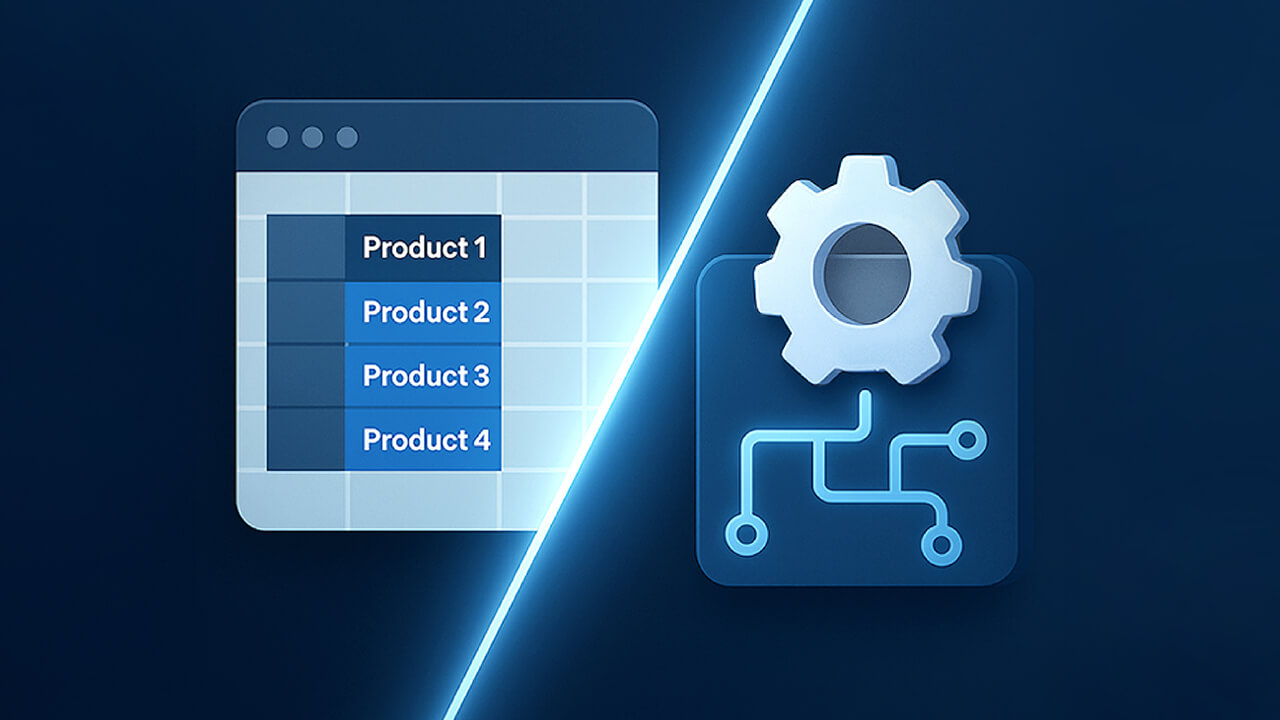Warehouse Management System (WMS) vs Unified ERP System: Differences and Advantages

5 min read
In order for a business to be agile and able to grow in today’s era, it must have entered the digital age, which has transformed the way they operate. Three top priorities for which companies are leveraging digital software are inventory visibility, demand planning, and procurement. Two key tools that can help businesses in these actions are the Warehouse Management System (WMS) and the Unified ERP System.
Very often these two tools are confused, however it is worth knowing their differences and advantages, as the right choice can determine the level of efficiency of your business, reduce costs, and support its future growth.
What is a Warehouse Management System?
A Warehouse Management System (WMS) is a software application designed to organize and monitor the operations of a warehouse.
Its goal is to ensure that all stages, from receiving products to shipping them, are carried out with maximum accuracy and, of course, speed.
What are the basic functions of a WMS?
A Warehouse Management System has five basic functions.
Recording incoming and outgoing products
The system has the ability to record every receipt and shipment so that there is a complete picture of what is in the warehouse.
Real-time inventory monitoring
The WMS allows immediate inventory updates, reducing the risk of shortages or excess inventory.
Picking and packing procedures
A warehouse management system guides employees on where the products are located and on the procedures they must follow to collect and pack orders.
Control of product returns and replenishments
With a Warehouse Management System you have a valuable tool that manages returns in an organized manner and suggests replenishment of products that are out of stock.
Warehouse space organization
The system exploits data to better utilize available space and reduce travel times.
Why choose a WMS?
Warehouse Management Systems have several advantages that you should know about.
Accuracy in inventory management
Automation significantly reduces human errors and offers more reliable data.
Speed in processes
Order execution is faster, with shorter picking and shipping execution times.
Cost optimization
With better control and organization, the operating costs of the warehouse are reduced.
Better Customer Service
Faster and more accurate order processing leads to greater customer satisfaction.
What is an Integrated ERP System?
Enterprise Resource Planning (ERP) is a comprehensive software platform that unifies the functions of all key departments of a business in a single database.
What functions does an ERP system have?
The basic functions of an ERP system touch many areas, from finance to customer service.
Finance and accounting
ERP systems gather all financial transactions and accounting data, offering a clear picture of the company’s revenues, expenses and profitability.
Purchasing and procurement
An ERP system automates purchasing and procurement processes, enabling better supplier management and more efficient cost control.
CRM and customer service
Through ERP, businesses have access to customer data and transaction history, which helps improve service and develop targeted marketing strategies.
Production and Operations
For manufacturing businesses, ERP connects raw materials, production planning, and finished goods management. This leads to greater efficiency and reduced waste.
What are the benefits of an ERP system?
Using an ERP system offers significant benefits that go beyond simply organizing data.
Data integration
All information is centralized in a central system, avoiding duplicate entries and data inconsistencies.
Better collaboration between departments
As all departments have access to the same database, communication is improved and the obstacles that often arise from isolated systems are reduced.
Strategic control and analysis
ERP provides reporting tools and dashboards, allowing executives to monitor performance indicators (KPIs) and make more informed decisions.
Growth support
As the business scales, ERP adapts and adds new functionalities, supporting sustainable growth and competitiveness in the market.
What are the main differences between WMS and ERP?
Both Warehouse Management Systems and ERP systems contribute to the modernization of a business, but they have different purposes and scope. To make it clearer where each focuses, it is worth looking at their main differences.
They focus on different functions
WMS focuses exclusively on warehouse processes, while ERP covers all departments of a company.
They provide a different level of specialization
The Warehouse Management System has more specialized tools for logistics, unlike ERP which provides a more general but less detailed picture of the warehouse.
They require a different level of investment
For small and medium-sized businesses, WMS is a more affordable option due to lower costs, while ERP requires a larger investment aimed at strategic benefits and long-term growth.
They support different growth opportunities
WMS is suitable for companies with a logistics focus, while ERP is more suitable for businesses that want to expand and consolidate their operations.
Which one to choose?
The choice between WMS and ERP largely depends on the size of the company, its priorities and its future plans.
Choose WMS exclusively for warehouse management
WMS are ideal if you need absolute accuracy and speed of logistics, without having complete integration across all departments.
Choose ERP if you need a single view of the business
ERP is the right solution when your company has many departments that need to collaborate and needs an overall view for better strategic decisions.
Choose ERP with WMS module if you want the best of both systems
Many businesses invest in an ERP that includes an integrated WMS module, so that they have both unified data and specialized warehouse management.
Warehouse Management Systems and Unified ERP Systems serve different needs, but both can significantly contribute to the modernization of a business.
WMS is the right choice for those who emphasize warehouse management, while ERP is aimed at companies that need a unified view and collaboration between all departments. The important thing is to evaluate your own priorities and choose the solution that will allow you to operate more efficiently and grow at steady pace.
Frequently asked questions about WMS and ERP systems
What is the difference between a WMS and an ERP?
WMS focuses exclusively on warehouse management, while ERP covers all the basic functions of the business.
Can a business use both a WMS and an ERP system?
Yes, a business can utilize both WMS and ERP at the same time. This can be done in two ways. Either through an ERP that has a built-in WMS module, or with a separate WMS that is connected to the ERP.
In the first case, management is simpler, since everything is done through one platform.
In the second case, there is greater specialization in the operation of the warehouse, which is useful when logistics needs are complex, such as in e-commerce.
In any case, it is important that the two systems communicate with each other, so that there are no errors or duplicate entries.
Which is more economical, WMS or ERP?
In general, WMS has a lower cost and is mainly aimed at small and medium-sized businesses, while ERP is a larger investment with strategic benefits in the long term.
When do I need ERP instead of WMS?
You need ERP when your business is not limited to just warehouse management but has many departments that need to work together, such as finance, procurement, sales or human resources. ERP gives you a single view of all operations, consolidates data on a single platform and helps make better strategic decisions.
It is the right choice for companies that want to grow, improve collaboration between departments and have full control over their entire activity.

